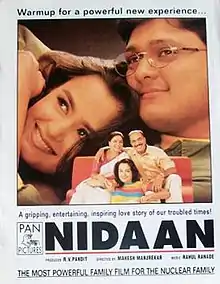| Nidaan | |
|---|---|
 | |
| Directed by | Mahesh Manjrekar |
| Written by |
|
| Produced by | R. V. Pandit |
| Starring | |
| Cinematography | Vijay Kumar Arora |
| Edited by | V. N. Mayekar |
| Music by | Rahul Ranade |
Release date | 28 July 2000 |
Running time | 146 minutes |
| Country | India |
| Language | Hindi |
Nidaan is a 2000 Indian family drama film directed by Mahesh Manjrekar and produced by R. V. Pandit. Sanjay Dutt, Shivaji Satam, Reema Lagoo, Nisha Bains and Sunil Barve appeared in the main roles. The plot involved the ordeal of an AIDS-infected patient in getting her disease treated on the backdrop of India's "sub-standard medical facilities".[1]
Cast
- Shivaji Satam as Anirudh Nadkarni
- Reema Lagoo as Suhasini A. 'Suhas' Nadkarni
- Nisha Bains as Soumya A. Nadkarni
- Sunil Barve as Ninad S. Kamat
- Sanjay Dutt as himself
- Mohan Joshi as Dr. Dhawan
- Shagufta Ali as Aditi Dhawan
- Sunil Shende as Dr. S.D. Potnis
- Shama Deshpande as Veena S. Kamat
- Dilip Prabhavalkar as Shrikant Kamat
Songs
| Nidaan | |
|---|---|
| Soundtrack album by Rahul Ranande | |
| Released | 20 May 2000 |
| Genre | Feature film soundtrack |
| Length | 51:58 |
| Label | Rajshri Music |
| No. | Title | Singer(s) | Length |
|---|---|---|---|
| 1. | "Aaja Re Chanda" | Ravindra Sathe, Kavita Krishnamurthy | |
| 2. | "Waqt Ki Kimat" | Nandu Bhende, Sagarika | |
| 3. | "Hum Aru Tum" | Kavita Krishnamurthy, Suresh Wadkar | |
| 4. | "O Kartar" | Sanjeev Abhyankar | |
| 5. | "Agar Ho Pyar" | Suresh Wadkar | |
| 6. | "Aaja Re Chanda" (Girl Version) | Sagarika | |
| 7. | "Aaja Re Chanda" (Sad Version) | Ravindra Sathe, Kavita Krishnamurthy | |
| 8. | "Aaja Re Chanda" (Instrumental) | Rahul Ranande | |
| 9. | "Title Music" | Rahul Ranande | |
| 10. | "Blood Bank" | Rahul Ranande | |
| 11. | "End Title" | Rahul Ranande | |
| 12. | "Pehla Din Hai College Ka" | Manohar Shetty | |
| 13. | "Yeh Hain Prem" | Milind Ingle |
Release
The film was released on 27 July 2000. It was also dubbed and released in Tamil as Uyirin Uyire.[2]
References
- ↑ Nair, Padmaraj (August 2000). "Nidaan: A must-watch, at long last!". Screen. Archived from the original on 19 August 2000. Retrieved 14 November 2018.
- ↑ "Uyirin Uyire". 27 December 2003. Archived from the original on 27 December 2003. Retrieved 24 May 2021.
External links
This article is issued from Wikipedia. The text is licensed under Creative Commons - Attribution - Sharealike. Additional terms may apply for the media files.